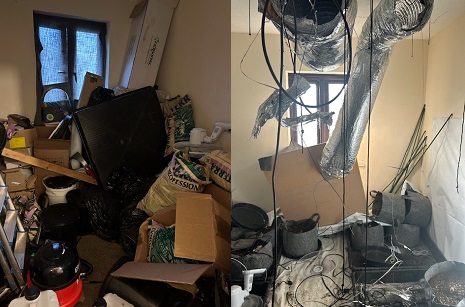CEO has aimed high… just not that high

As CEO of No Letting Go - a UK provider of inventory and property reporting inspections - you would expect Nick Lyons to have seen it all in his time. Certainly, Lyons would not have expected to be caught out by rogue tenants, using his South London flat as a base for an illicit drugs operation.
So, imagine Lyons’ disbelief when he discovered just that - a marijuana factory in the rental property, where his tenants’ illegal cottage industry was in full swing. And such was the damage they caused – up to £10,000 worth – that their enterprise threatened to leave the CEO... er… high… and dry.
Lyons (pictured) believes his experience is a cautionary tale for other landlords in a market that is already challenging because of greater regulation and a higher tax burden. Home-based cannabis farms, set up in rented properties without the owners’ knowledge are a growing trend. (As a landlord myself, I was offered good money six months ago to knowingly allow marijuana production in my rental property – I politely declined.)
Following the dubious discovery at his flat and the costly damage caused, Lyons confided to Mortgage Introducer: “I am being more selective on property location - and returns, to cover costs.”
Lyons has a small portfolio of properties in and around South London, which he has owned for many years. He considers himself a thorough landlord and does not cut corners, but his attention to detail and his industry credentials weren’t enough to protect him from the drama that unfolded at his flat.
It centred on the third floor of a block in South East London, where four years ago an agent found Lyons a new tenant. The man was referenced and insurance was taken out, the tenant paid rent on time and allowed mid-term inspections. All seemed well.
“The first sign of trouble came after a year when neighbours noticed the windows were blacked out with paper,” Lyons explained. “They raised concerns, calling both the police and the agent to check. This happened several times. The tenant explained that he worked nights and blacked out the windows to sleep during the day. It seemed plausible, so no further issues were raised.”
In August of this year, Lyons received a call from the estate management company informing him that the fire brigade had had to force entry because water was dripping into the flat below. The source was discovered - a malfunctioning irrigation system, set up to water marijuana plants, would you believe?
Not only that, every room was filled with plants, chemicals, grow bags, water filtration systems, and a cat’s cradle of venting and heating equipment used for growing and harvesting (pictured inset). No-one was living there – extraordinarily, the entire setup was being controlled remotely. The electrics had been tampered with, ceilings were damaged to install the venting systems, and the carpets were ruined. In short, the property was completely uninhabitable.


Police removed the plants and secured the property, but warned that it was unlikely anyone would be charged as finding the responsible individuals was considered low priority. In fact, the tenant claimed he had sub-let the flat and knew nothing of the operation himself. Lyons naturally followed up with the agent, who admitted they had not been able to carry out any inspections for the past year.
Read more: "They almost wanted rid of the 'old accidental landlords' – and it worked!"
How could this have been avoided?
“We’ll probably never know the full story,” Lyons said. “This case should have raised red flags. The agent should have arranged to meet me at the property if access was repeatedly denied. Had this been done earlier, we might have discovered the problem before it escalated.”
Thankfully, some costs of the damage will be covered by insurance and the tenant’s deposit.
“The property will be completely refurbished and therefore be back on the market within weeks,” Lyons shared. “As the property is in a block on an estate, the insurance is part of the estate buildings insurance which forms part of the service charge. The insurance has a malicious damage clause, which, subject to loss adjustor review, will be determined by the insurer. I am not sure how that will impact the whole estate policy.
“This, and many other issues, are challenging, particularly on estates in urban areas. Many of these issues are a symptom of society - which is a broader subject. We are now considering selling this property, partly due to the issues but also my distrust in the government’s approach to protecting landlords.”
Labour has introduced its Renters’ Rights Bill, which aims to deliver on its manifesto commitment to transform the experience of private renting, including abolishing fixed term assured tenancies and assured shorthold tenancies.
“The government has to balance fairness between landlords and tenants, and I fear that the emphasis is now heavily weighted in favour of tenants,” Lyons commented. “Whilst the forthcoming Renters’ Rights Bill will have some positives, the negatives will be the process to remove problem tenants - non-paying or otherwise. Unless a solution to the backlog in the court process is addressed it will make it more difficult to remove these tenants from next year.
“From a landlord perspective, we accept that there are challenges and have to manage them but also need to get paid with a return on the investment. The new tax burden doesn’t encourage this. Squeezing landlords will only exasperate this by forcing many out.”
Lyons, meanwhile, hopes that his story will inform others in the sector.
“The most important takeaway for landlords and agents is the value of thorough documentation,” he said. “Evidence is essential, not only for deposit claims but also for insurance purposes. While I’ll recover some costs, the agent’s failure to conduct inspections has cost me thousands - not an easy conversation for any agent to have with their landlord, and one that certainly affects their reputation.”



